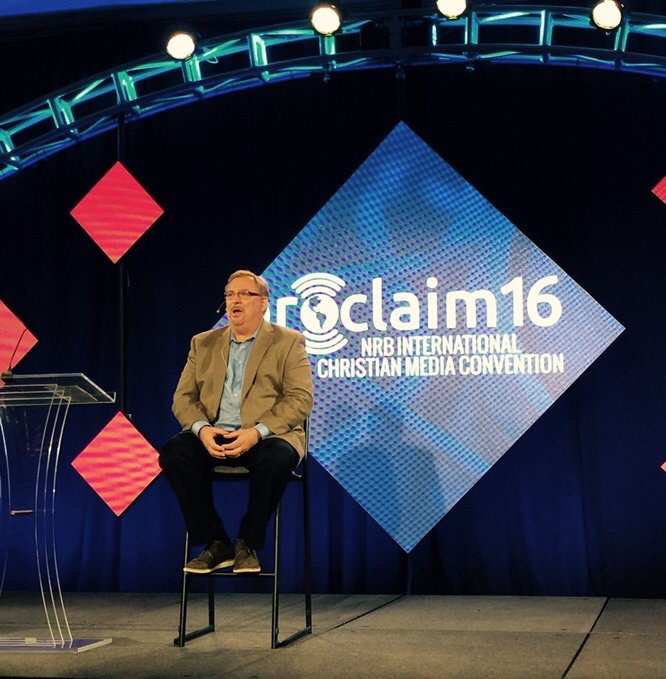National Religious Broadcasters is convening this week in Nashville, and if Alexis de Tocqueville were here in the labyrinthine Opryland Hotel he would not be surprised. Among the near record number of 5000 participants there’s little evidence of supposedly secularizing America. Instead there is on display in every direction the entrepreneurship, bric-à-brac, studied vitality and cultural effervescence of American Evangelicalism. As Tocqueville found in 1830s America, so he would find today that American religion is very democratic, culturally adaptable and woven almost seamlessly into almost every arena of American life. As American religion is so decentralized and individualistic, it is beyond the control of political and cultural elites who might seek to contain or control it.
Nearly every person I randomly meet here describes their own ministry unselfconsciously in enterprising and pioneering language that echoes what Tocqueville likely heard from frontier revivalists and pamphleteers nearly 200 years ago. Denominations and centralized religious institutions don’t have much presence here. Instead there are thousands of men and women who are creatively promoting the Gospel through their own ingenuity. Some have full time religious professional vocations. Others, like a very successful, evangelism-minded car wash mogul who delivered a powerful prayer this evening, have lucrative businesses which support their ministry passions, like Saint Paul’s tent-making.
A speaker today with a decidedly full time religious vocation was megachurch pastor and bestselling author Rick Warren, who gave practical counsel at a clergy lunch and shared his life story at the evening plenary. Called to ministry while a teenager, Warren by remarkable providence founded a southern California Southern Baptist congregation where tens of thousands now worship while he writes books read by tens of millions. He’s a pastor, communicator, entrepreneur par excellence, who embodies the interconnections among American religion, global humanitarianism, marketing, popular culture and politics. His autobiographical remembrance includes self doubts, early marital strife, his son’s long struggle with depression ending with suicide, and a ministry that strategically has reached literally every nation state and is now targeting obscure unreached tribes.
Warren’s style is conversational and California informal while relentlessly “purpose-driven,” to recall the phrase of his bestsellers. He has stylistically adapted to culture while seeking to transform it with the Gospel. And like nearly everyone at NRB, he does not focus much on ethereal theology or esoteric metaphysics. He is profoundly practical and sensible. Critics of American Evangelicalism often fault supposed obsession with obtuse doctrine and debilitating preoccupation with the afterlife. This critique typically evinces little to no firsthand actual knowledge about American Evangelicals.
As Tocqueville observed in his Democracy in America:
Not only do the Americans follow their religion from interest, but they often place in this world the interest that makes them follow it. In the Middle Ages the clergy spoke of nothing but a future state; they hardly cared to prove that a sincere Christian may be a happy man here below. But the American preachers are constantly referring to the earth, and it is only with great difficulty that they can divert their attention from it. To touch their congregations, they always show them how favorable religious opinions are to freedom and public tranquillity; and it is often difficult to ascertain from their discourses whether the principal object of religion is to procure eternal felicity in the other world or prosperity in this.
Tocqueville saw that American revivalists understood salvation practically as life eternal evinced through life abundant. Their very democratic understanding of religion empowers all who are called and willing to lead in God’s work. That spirit animates much of American Evangelicalism today, though few critics understand as Tocqueville did the brilliant simplicity of its success.





Comment by John Hutchinson on February 26, 2016 at 7:26 pm
Singing paeans to American Evangelical ingenuity. Yet the nones have tripled from 8% – 23% from 1990 to 2015. And while the influence of less than 10% of Christians in the Roman Empire were somehow able to cause a cultural overthrow of the Hellenistic-Roman pagan pantheon; numbers purported triple that in the American Evangelical world have little influence from the palpable and quick spiritual and cultural retreat.
By their fruits, you shall know them.
Comment by accelerator on March 5, 2016 at 11:39 am
Wheats and Tares. Always have, always will. It’snot numbers but faithfulness.